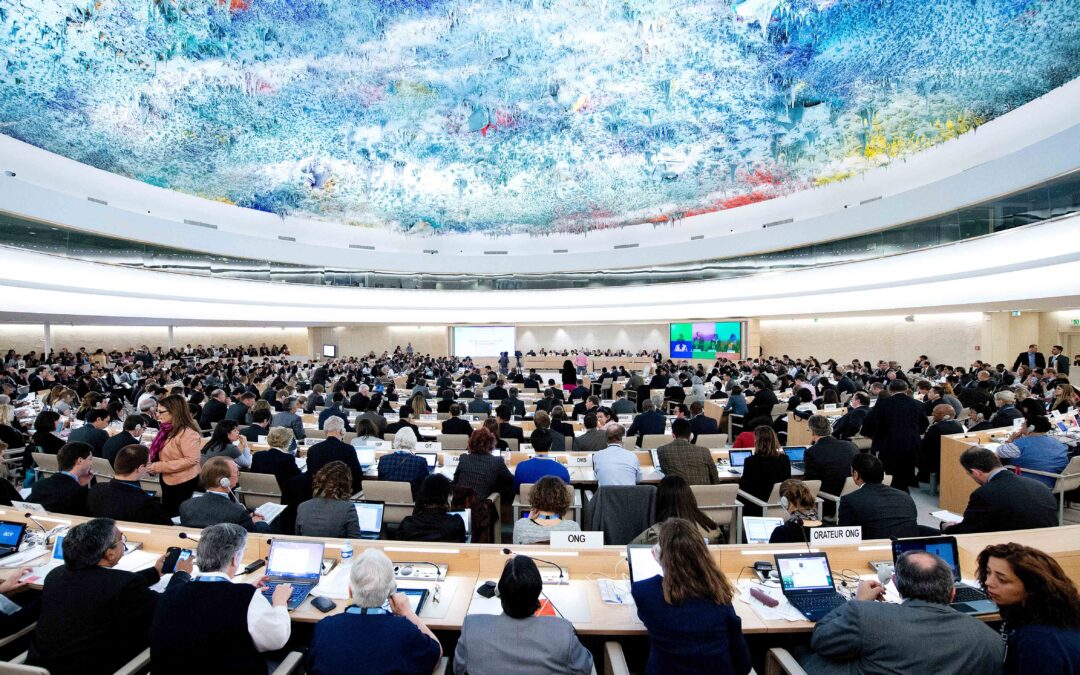
Sep 12, 2017 | Advocacy, Non-legal submissions
The ICJ today made an oral statement to the UN Human Rights Council, on the crisis for human rights and the rule of law in Venezuela.
The statement was made in general debate under item 2 on the oral update delivered by the High Commissioner for Human Rights.
The ICJ statement read as follows:
“The ICJ welcomes the efforts of the High Commissioner and his Office to document and draw attention to the situation in Venezuela, including through the report published on 30 August. As the High Commissioner highlighted, the situation only continues to worsen and the ICJ fully supports his call for the Council to establish an international investigation into human rights violations in Venezuela.
The deep human rights crisis and the breakdown of the rule of law in Venezuela is undoubtedly the most worrying situation in the American hemisphere.
Arbitrary detentions, extrajudicial and arbitrary executions, military trials of civilians and persecutions and harassments of opponents, dissidents and human rights defenders have become systematic and widespread practices.
The combined action of the Supreme Court of Justice, the Government and the National Constituent Assembly has destroyed the rule of law, suppressing the separation of powers, delivering a fatal blow to the Legislative, and seriously undermining independence and impartiality of the Judiciary.
The 1999 Constitution has de facto ceased to be in force and the road to arbitrary exercise of power has begun.
The ICJ considers that it is imperative that the Human Rights Council take action on this serious situation.”
The High Commissioner, in his oral update on 11 September, had stated as follows in relation to Venezuela:
“Last month my Office issued a report on Venezuela, highlighting excessive use of force by security officers, and multiple other human rights violations, in the context of anti-Government protests. There is a very real danger that tensions will further escalate, with the Government crushing democratic institutions and critical voices – including through criminal proceedings against opposition leaders, recourse to arbitrary detentions, excessive use of force, and ill-treatment of detainees, which in some cases amounts to torture. Venezuela is a Member State of this Council, and as such has a particular duty to “uphold the highest standards in the promotion and protection of human rights”, in the words of Resolution 60/251. My investigation suggests the possibility that crimes against humanity may have been committed, which can only be confirmed by a subsequent criminal investigation. While I support the concept of a national Truth and Reconciliation Commission, the current mechanism is inadequate. I therefore urge that it be reconfigured with the support and involvement of the international community. I also urge this Council to establish an international investigation into the human rights violations in Venezuela.”
The ICJ also launched today a new report on Venezuela, and convened a side event to discuss the need for action by the Human Rights Council.
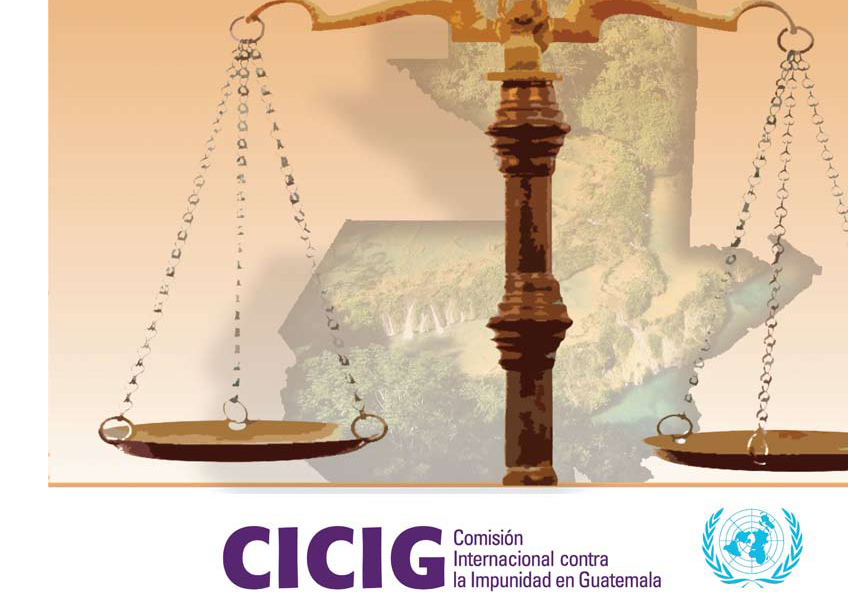
Aug 30, 2017 | Comunicados de prensa, Noticias
La CIJ considera que la crisis institucional que se vive en Guatemala requiere la intervención directa del Secretario General de Naciones Unidas Sr. Antonio Guterres.
La CIJ a la comunidad nacional e internacional expresa:
1. El Acuerdo entre La Organización de las Naciones Unidas y el Gobierno de Guatemala, relativo al establecimiento de una Comisión Internacional contra la Impunidad en Guatemala (CICIG), en su punto 10 numeral 4. , establece el compromiso del Gobierno, de proporcionar a la CICIG y a su personal, en todo el territorio, “la seguridad necesaria para el cumplimiento eficaz de sus actividades”. Además, el punto 10 citado anteriormente, compromete al Gobierno de Guatemala a velar por que el personal de la CICIG, nacional o internacional, no sea objeto de abusos, amenazas, represalias o intimidaciones, por el desempeño de su trabajo.
2. Los actos unilaterales del Presidente Jimmy Morales constituyen una violación a dichas garantías y pueden interpretarse como un mecanismo para afectar el eficiente trabajo que viene realizando el Comisionado Iván Velásquez al frente de la CICIG; para obstaculizar la justicia, para interferir en la Independencia del Poder Judicial y promover así, más impunidad en el país.
3. La decisión de la Corte de Constitucionalidad de dejar en suspenso en forma definitiva el acto reclamado por el Procurador de los Derechos Humanos y de esa forma, dejar sin efecto el acto unilateral por medio del cual el Presidente Jimmy Morales declaró “persona non grata” al Comisionado Velásquez, viene a reforzar el Estado de Derecho en Guatemala y fortalece al máximo Tribunal Constitucional.
Sam Zarifi, Secretario General de la Comisión Internacional de Juristas expresó:
“Ante la crisis institucional que se vive en Guatemala, la Comisión Internacional de Juristas considera que es necesaria la intervención directa del Secretario General de Naciones Unidas Sr. Antonio Guterres mediante una Misión de Alto Nivel, que permita evaluar “in loco”, si el Gobierno de Guatemala está dispuesto a honrar el Acuerdo firmado en la ciudad de Nueva York el 12 de diciembre de 2006.”
“El Gobierno de Guatemala debe dar a la Organización de las Naciones Unidas, garantías convincentes de que la CICIG, el Comisionado Iván Velásquez y todo su personal nacional e internacional, podrán cumplir en el futuro con sus funciones, sin abusos, amenazas, represalias o intimidaciones de ningún tipo,” concluyó.
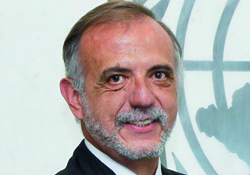
Aug 28, 2017 | Comunicados de prensa, Noticias
La CIJ dice que la declaración de Iván Velásquez como persona no grata es un fraude de ley y sin efecto legal.
La CIJ a la comunidad nacional e internacional expresa:
- Que la decisión del Presidente Morales de declarar “non grato” y de expulsar del país a Comisionado Iván Velásquez (foto), es nula “de pleno derecho” y no nació a la vida jurídica por las siguientes razones:
- Fue emitida de “mala fe” por el Presidente Morales, ya que el verdadero objetivo de la misma es obstruir a la justicia y proteger a él y a su familia; en tal sentido viola la Convención de Viena sobre el Derecho de los Tratados (artículo 26), ratificada por el Estado de Guatemala;
- Por tal razón, se trata de un acto contrario al Derecho internacional de los Derechos Humanos, que también viola el artículo 149 de la Constitución Política de la República de Guatemala;
- Nuevamente se configura el “fraude de ley“, de conformidad con el artículo 4. segundo párrafo, de la Ley del Organismo Judicial (Dto. 2-89 del Congreso de la República), ya que de conformidad con dicho artículo “los actos realizados al amparo del texto de una norma, que persigan un resultado prohibido por el ordenamiento jurídico, o contrario a él, se consideran ejecutadas en fraude de ley y no impedirán la debida aplicación de la norma que se hubiere tratado de eludir”;
- El Presidente Morales resolvió declarar non grato al Comisionado Velásquez para obstruir la justicia y provocar más impunidad; es importante recordar que la lucha contra la impunidad constituye una norma imperativa delDerecho internacional, de carácter obligatorio y que no admite derogación alguna;
- El acto unilateral del Presidente Morales atenta contra la Independencia Judicial. En menos de dos meses, es la segunda vez que el Presidente Morales comete este tipo de hecho antijurídico, ya que con anterioridad, trató de influir ilegalmente en los magistrados de la Corte Suprema de Justicia;
- Según el artículo 4. primer párrafo de la Ley del Organismo Judicial citada, “los actos contrarios a las normas imperativas y a las prohibitivas expresas, son nulos de pleno derecho”.
- Por todo ello, la CIJ pide al Ministerio Público abrir un expediente en contra del Presidente Morales y hacer todo lo que esté a su alcance, para que se deduzcan las responsabilidades penales y civiles a que da lugar, la conducta ilegal del Presidente de la República.
- La CIJ apoya y valora altamente la gestión del Comisionado de la CICIG Iván Velásquez
Ramón Cadena, Director de la CIJ para Centroamérica expresó:
“La decisión del Presidente Jimmy Morales es inaceptable y su actitud de no cumplir con la resolución que otorga amparo provisional de la Corte de Constitucionalidad debe ser acatada por él en forma inmediata. De lo contrario, estará incurriendo en otro delito.”
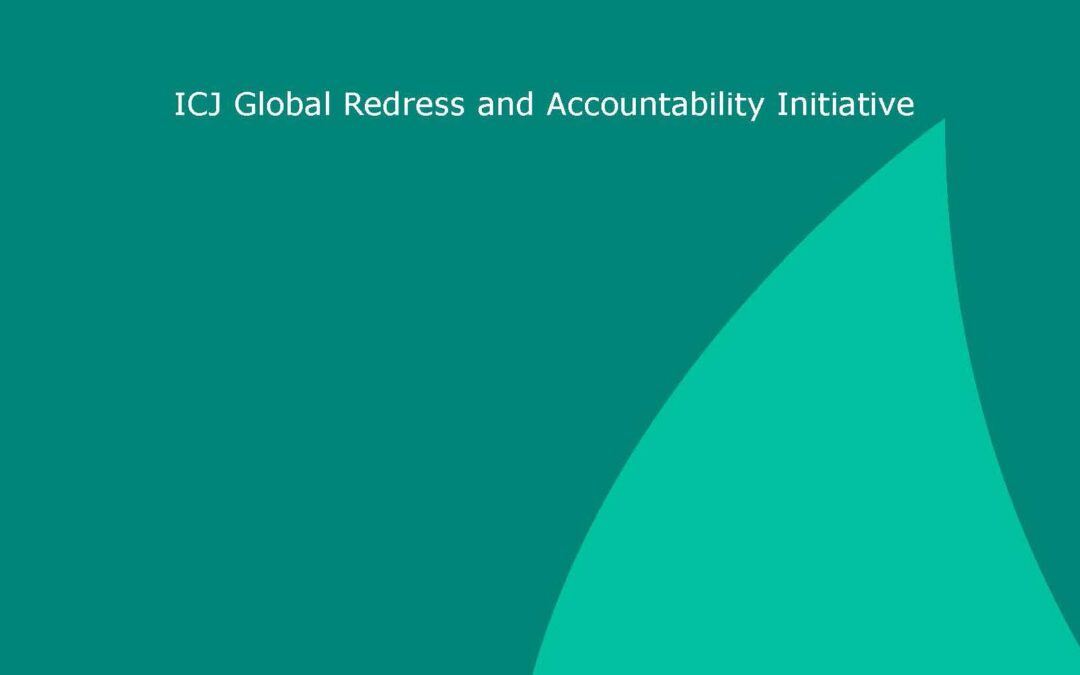
Aug 22, 2017 | News, Publications, Reports, Thematic reports, Video clips
The institutional political crisis in Venezuela has brought the rule of law to near collapse and severely obstructed accountability for those responsible for gross human rights violations, the ICJ concluded in a report released today.
The ICJ’s report Achieving Justice for Gross Human Rights Violations in Venezuela found that the authorities led by President Nicolás Maduro have undertaken a sustained campaign to take control of the Supreme Court of Justice and, with the Supreme Court’s support, suspend the constitutional powers of the former National Assembly and subvert efforts to hold the executive to account within a rule of law framework.
“Rule of law in Venezuela has been replaced by rule of arbitrary executive power,” said Alex Conte, ICJ’s Global Accountability coordinator.
“The Constitution is disregarded, the judiciary cannot exercise its independent function, and the separation of powers is non-existent,” he added.
The ICJ’s report concludes that the human rights situation in Venezuela has deteriorated rapidly in recent years, particularly since 2014.
Extrajudicial and arbitrary executions, the practices of torture and ill-treatment, arbitrary detention, the trial of civilians by military courts and the criminalization and prosecution of political and social dissent have only increased.
“The political context of extreme polarization and the breakdown of the rule of law, along with the judiciary’s lack of independence, have severely obstructed accountability for those responsible for gross human rights violations,” said Conte.
“Victims and their families are left without justice.”
This situation has been further exacerbated by the recent dismissal of Venezuela’s Attorney General, described by the ICJ as a politically motivated act that violates international standards and removes one of the last institutional checks on executive authority and destroys one of the few glimmers of hope for an end to impunity for human rights violations.
Also troubling is the establishment by the new Consituent National Assembly of a ‘Truth Commission’, which the ICJ fears will be a politically manipulated instrument aimed at entrenching impunity for the executive and, when combined with President Maduro’s declaration that legal immunity will be stripped from National Assembly members that have opposed him, a tool to silence Government opposition, rather than to help discharge Venezuela’s duty to promptly, independently and effectively investigate allegations of gross human rights violations.
“Venezuela’s situation of entrenched impunity cannot be resolved without the establishment of an independent judicial authority that can address human rights violations, deter further violations and help bring back the rule of law,” Conte added.
Contact:
Alex Conte, ICJ Global Redress and Accountability Initiative, t: +41 79 957 27 33; e: alex.conte(a)icj.org
Federico Andreu Guzman, ICJ Senior Legal Adviser, Americas, e: Federico.andreu(a)icj.org
Venezuela-GRA Baseline Study-Publications-Reports-Thematic reports-2017-ENG (full report, PDF)
Read also:
ICJ Position Paper on the Dismissal of the Attorney General of Venezuela (August 2017)
ICJ Report, Venezuela: The Sunset of the Rule of Law (October 2015)
ICJ Report, Strengthening the Rule of Law in Venezuela (November 2014)
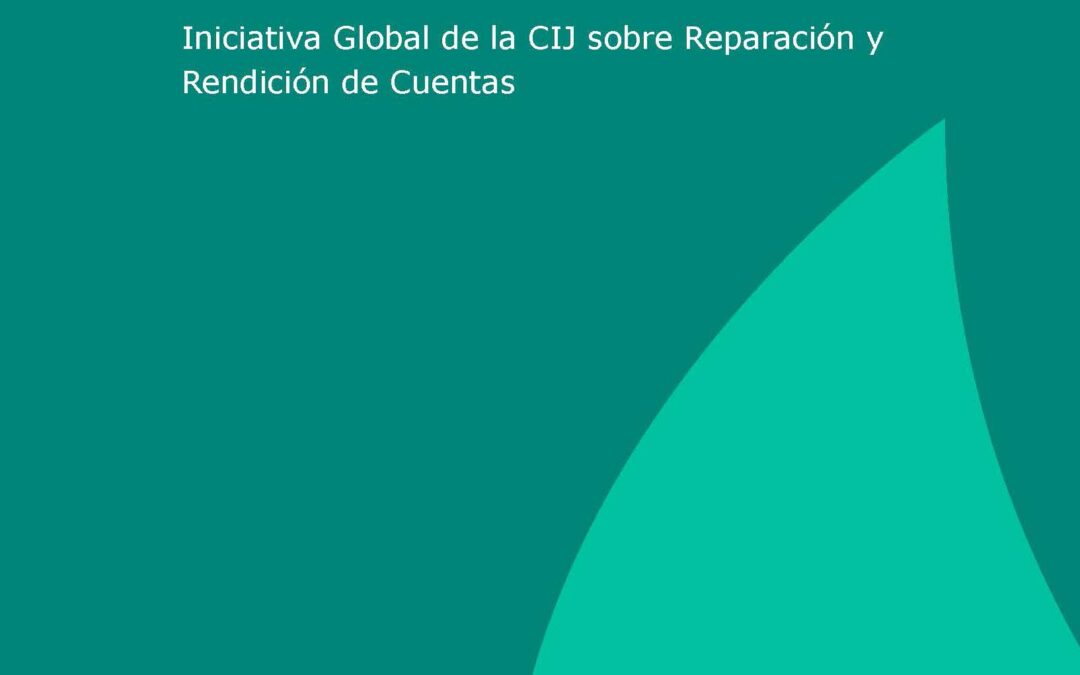
Aug 22, 2017
La crisis política institucional en Venezuela ha llevado al colapso Estado de Derecho y ha obstaculizado gravemente la rendición de cuenta de los responsables de graves violaciones a los derechos humanos, concluyó la CIJ en un informe publicado hoy.
El informe de la CIJ Lograr justicia por graves violaciones a los derechos humanos en Venezuela constató que el gobierno de Presidente Nicolás Maduro han emprendido una sostenida campaña para tomar el control del Tribunal Supremo de Justicia, suspender, con el apoyo del máximo órgano de justicia, los poderes constitucionales de la anterior Asamblea Nacional, arrogarse amplísimos poderes y subvertir el Estado de Derecho.
“El Estado de Derecho en Venezuela ha sido reemplazado por el ejercicio arbitrario del poder por el Ejecutivo,” dijo Alex Conte, coordinador de la Iniciativa Global de la CIJ sobre Reparación y Rendición de Cuentas.
“La Constitución no es respetada, el Poder Judicial no es independiente y la separación de poderes es inexistente,” agregó Conte.
El informe del CIJ concluye que la situación de los derechos humanos en Venezuela se ha deteriorado rápidamente en los últimos años, especialmente desde 2014.
Las ejecuciones extrajudiciales y arbitrarias, la práctica de la tortura y malos tratos, las detenciones arbitrarias y el juzgamiento de civiles por tribunales militares, así como la criminalización y persecución de toda forma de disidencia política y social se han incrementado vertiginosamente.
“El contexto político de extrema polarización y la ruptura del Estado de Derecho, así como la falta de independencia del Poder Judicial, han obstaculizado gravemente la rendición de cuenta de los responsables de graves violaciones a los derechos humanos. Las víctimas y sus familias han visto denegado su derecho a la justicia,” dijo Conte.
Esta situación ha sido exacerbada por la reciente destitución de la Fiscal General de la República, calificada por la CIJ como un acto políticamente motivado, violatoria de los estándares internacionales, y que elimina uno de los últimos controles institucionales del Poder Ejecutivo y destruye uno de los pocos destellos de esperanza para una poner fin a la impunidad por las violaciones a los derechos humanos.
La CIJ considera que la creación de una “Comisión de la Verdad” por la Asamblea Nacional Constituyente es preocupante, toda vez que existen grandes temores de que sea un instrumento manipulado políticamente para afianzar la impunidad del Ejecutivo y para silenciar a la oposición, en lugar de cumplir con el deber del Estado de investigar pronta y efectivamente las denuncias de graves violaciones a los derechos humanos.
“La arraigada situación de impunidad en Venezuela no puede ser superada sin el establecimiento de un Poder Judicial independiente que pueda abordar las violaciones a los derechos humanos, disuadir de futuras violaciones y ayudar restablecer el Estado de Derecho,” agregó Conte.
Contacto:
Alex Conte, Coordinador de la Iniciativa Global de la CIJ sobre Reparación y Rendición de Cuentas, t: +41 79 957 27 33, C.E.:alex.conte(a)icj.org
Federico Andreu Guzmán, Representante de la CIJ para Suramérica, C.E.: federico.andreu(a)icj.org
Venezuela-GRABaseline Study-Publications-Reports-Thematic reports-2017-SPA (informe en PDF)









